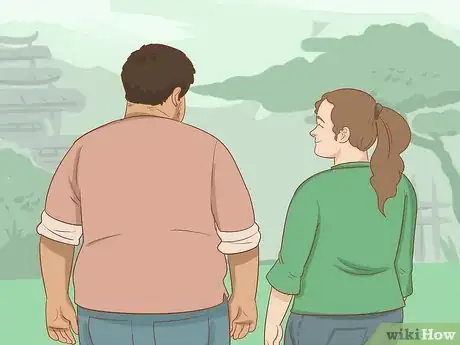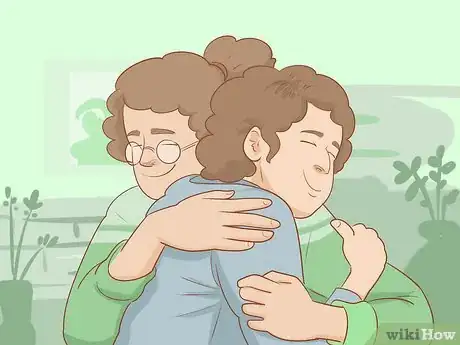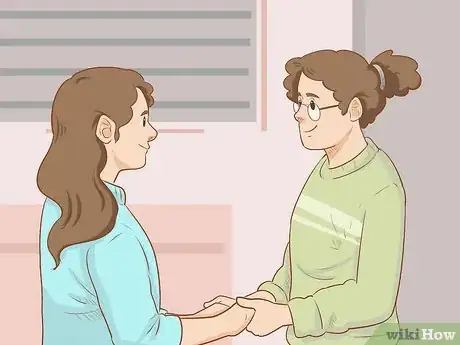wikiHow is a “wiki,” similar to Wikipedia, which means that many of our articles are co-written by multiple authors. To create this article, 10 people, some anonymous, worked to edit and improve it over time.
This article has been viewed 30,797 times.
Learn more...
Is it possible to love everybody? That all depends on what you mean by "love". If it means tolerating and respecting others, then it may be possible to love many people while still being realistic. It certainly doesn't mean liking or agreeing with everyone but you can do your best to respect every person's dignity, to listen to their story and to use love as the pathway to gaining, at the very least, an understanding of the other. Here are some suggestions for ways in which you might find the capacity to "love everybody".
Steps
Your Thoughts of Others
-
1Find the good, on purpose. To be able to love everybody, even people you've just met, you need to find something you like, admire or appreciate about them.
This means setting aside judgment, bias and prejudices so that you can connect with the person at a similar level.[1] To do this is difficult. Acknowledge that it is difficult but work through that to do your best and show love.- Find at least one to three things about the other person that strike you as being interesting, admirable, inspiring, cool, special, etc. It must be something that you consider a positive aspect.
- Keep trying until you manage this. It becomes a fun thing to do, to challenge yourself to this task until it is achieved.
-
2Learn to let go of judgmental approaches toward others. Again, this is a hard thing to do. From early on, human beings are trained in "us" and "them" thinking. It's how families, suburbs, towns, cities, regions, states and countries define themselves.
By making some people "other" or "them", it becomes easier to fault them, to dismiss them and to even hate them. Yet, they are human beings, just like you. Some of the ways to help yourself pass this style of thinking, here are things to try:- Catch your mean thoughts as they arise. You know the ones, the ones that put people into boxes.[2]
- Avoid judging the "book by its cover". How do you truly know a person until you've taken the time to get to know them?
- Remind yourself that everyone consists of layers. Some layers show to some people, other layers to other people. Think about the situation you meet this person in, or the manner in which you have come to know this person. Might those external factors be influencing your opinion of them?
- Accept your differences. If every human being looked like and acted like every other human being, you wouldn't be reading this. There'd be no point. Everyone would be of one bland mind, all shuffling along focused merely on surviving, not creating or sparking off one another and not trying valiantly to work out one's place in the world. The differences between human beings enable people to thrive, to create and to innovate. Celebrate this fact rather than finding it something to be feared.[3]
Advertisement -
3Make a decision to turn your mind to liking other people. Put people you meet into positive terms in your mind, using the good things that you've found in them.
For example, if you classify people by their outlook, tell yourself that "she/he is pretty". Not too much detail, just "pretty" is sufficient. And say this loud in your head. Sooner or later you will start to automatically look for and repeat the nice and the kind things about people to yourself, and therefore you will start to like other people better.
Remember, if you think of people in ways that is clearly wrong, like calling morbidly obese folks skinny, this ritual becomes more like something you have to say, rather than something you mean. Look for the good parts of each person, and say those "aloud" in your head.
Making Positive Judgements Instead
-
1Bond with your loved ones and friends. Knowing what being supported feels like and how to support others close to you can help to make it easier to love and bond with others less close to you.[4]
-
2Think kindly of the new people you meet. This is a kind of judging, only it is one with positive input.
-
3Persevere, especially with the least likable. If you have a nemesis, learning to love him/her will take time. However, it is possible to turn negative thoughts about anyone, into positive ones.
-
4Deal with confrontational, difficult and mean people with good spirit. It's easy to react angrily and to feel spite toward the person who delivers nasty comments, who insists on being difficult to get along with or who is itching for a fight.
Be the better person and stay calm. Do not respond to their provocations but pretend that you have not even noticed that aspect of their attitude toward you. Talk kindly to this person and focus on facts, leaving emotional outbursts far behind.[5]- Harsh words usually lead to more harsh words, and increased anger.
-
5Consult with others on what to do, as they may have good ideas to help you. An honest discussion with someone you trust about how hard you find it to like "X" (a mutual acquaintance/a friend/someone you know but they don't, etc.) can provide you with a sounding board that reveals what you might be doing to make things worse.
It might also help you to see what you're missing or perceiving incorrectly. Or, it may just be good to talk it through and find new ways of trying again with the person you're finding it hard to like. -
6Be willing to acknowledge other people's flaws. Remember, no human is perfect; they may say a bad idea but mean well. Determine people's characters through their actions rather than merely the words they speak.
- Understanding people's flaws does not mean accepting their bad attitude or poor behavior. It means seeking to understand so that you don't become embittered, feel blamed or take the burdens of that person onto yourself.
-
7Be kind to yourself. It is hard to not judge others. It is a habit and you may well fall back into it. Recognize this and don't quit. Give it your best.
Community Q&A
-
QuestionHow not to be angry with everyone?
 BrookeCommunity AnswerThink of the good things in everyone. Stay positive, and find the good qualities in them instead of the bad ones. If you still get frustrated, take deep breaths and stay calm. Every time you are angry, keep telling yourself, ''I am calm, I am calm'' and this will help you become a better and calmer person.
BrookeCommunity AnswerThink of the good things in everyone. Stay positive, and find the good qualities in them instead of the bad ones. If you still get frustrated, take deep breaths and stay calm. Every time you are angry, keep telling yourself, ''I am calm, I am calm'' and this will help you become a better and calmer person.
Warnings
- Understanding of others takes time.⧼thumbs_response⧽
- Your nemesis could be harder to love, but it's possible with determination and strength.⧼thumbs_response⧽
References
- ↑ https://www.rickhanson.net/see-the-good-in-others/
- ↑ https://www.independent.co.uk/life-style/8-ways-to-deal-with-people-that-you-dont-like-a7810126.html
- ↑ http://www.lifecoachexpert.co.uk/acceptingotherpeopledifferences.html
- ↑ https://www.huffpost.com/entry/love-and-relationships_b_4141884
- ↑ https://www.helpguide.org/articles/relationships-communication/conflict-resolution-skills.htm




































































